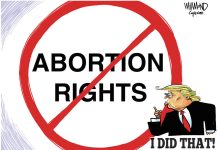When I was growing up in Kentucky, my parents were eligible for the federal government’s commodities program, the forerunner of food stamps and SNAP (Supplemental Nutrition Assistance Program).
I remember a few of the things they received, including powdered milk, which was just awful, and big blocks of orange-ish cheese, which was actually pretty good. I’m sure there were things like dried beans, flour and powdered eggs in the allotment, but I have no clear memory of them.
What I do recall vividly is having to stand in line with them while they waited their turn. It seemed like it took hours to a child enduring forced inactivity, and maybe it seemed even longer to them. I’m sure they were embarrassed at having to be herded into a handout line. Perhaps they even felt ashamed and, one of today’s favored words for the less-well- off, “stigmatized.”
On the other hand, maybe that was one of the last straws that persuaded them to get the heck out of one of the country’s worst pockets of poverty and seek a better life up north.
If so, good for them, and good for the federal government for getting at least one small thing right for a change.
It seemed to me then, and does so now, a brilliant idea. If people are hungry, you give them food. Then, when they get back on their feet or find better circumstances, you give the food to someone else.
The government, unfortunately, is never one to leave well enough alone, so its food program evolved into food stamps, which were like money, and then the SNAP program, which uses electronic transfers not unlike debit or credit cards. And the restrictions on what can be bought have gradually disappeared even as the number of people eligible has exploded and the idea of “temporary” assistance has been obliterated.
“Supplemental Nutritional Assistance Program” is one of the most wickedly misnamed federal initiatives ever. It has really become just another wealth-transfer scheme and one more way to perpetuate a permanent underclass.
Finally, someone seemed to have a better idea — President Trump of all people, who suggested creating an “American Harvest Box” containing “shelf-stable milk, ready to eat cereals, pasta, peanut butter, beans and canned fruit and vegetables.” It was proposed to replace only half of recipients’ electronic-transfer funds, but, hey, it would be a start.
One critic has called the box “crumbs to the poor” and described the contents as “a sad box of bland, repetitive basics.”
You know another way to say that? “Supplemental nutrition.”
It turns out, though, that Trump probably wasn’t serious. He was just “trolling the liberals” again, goading them into saying incomprehensibly stupid things.
Worked like a charm, I guess.
Just consider this, from Joel Berg, CEO of Hunger Free America, who says the administration is proposing “taking over $200 billion worth of food from poor Americans” while “increasing bureaucracy and reducing choices.” SNAP is a “free-market model” that lets people make their own choices at supermarkets instead of giving over the choice to “a bureaucrat in D.C.”
No, you didn’t misread any of that. It’s actually a liberal praising free markets and criticizing the bureaucrats of big government.
And think about this, if you had any doubts about what progressive, government statists think of the American people: “It isn’t clear,” says Stacy Dean, vice president for food assistance policy at the Center for Budget and Policy Priorities, “whether the boxes will come with directions on how to cook the foods inside.”
Just imagine a poor person, used to feasting until sated merely by opening a bag of chips, starving to death while trying to figure out how to spread peanut butter on a slice of bread. And, heaven forbid comments Ed Straker, senior writer at Newsmachete.com, that a family be confronted with “packages of unopened macaroni.” That’s the poor for you — too dumb to boil water.
We shouldn’t hold our breath waiting for someone in Washington to make a proposal like Trump’s in all earnestness.
There is a dirty little secret about this. You have to look for it, but it’s there.
“If food stamps are taken out,” Barry Flinchbaugh, Kansas State agricultural economist, recently told a convention of grain growers, “it will be the last farm bill. The urban Congress won’t support a crop bill without food stamps.”
There is an unholy alliance, you see, between urban advocates for food stamps, who vote for crop subsidies to get votes from rural representatives for their programs, and rural advocates for agriculture, who vote for food stamps to get votes from urban representatives for their programs. That is why we have a Department of Agriculture with a budget of $155 billion, a whopping 71 percent of which goes to “nutrition assistance.”
Add all the unholy alliances together and you get a debt that’s $20 trillion (and climbing) and pathological profligacy.
Something to chew on.
Leo Morris is a columnist for The Indiana Policy Review and opinion editor of the Fort Wayne News-Sentinel. Contact him at [email protected]. Send comments to [email protected].



